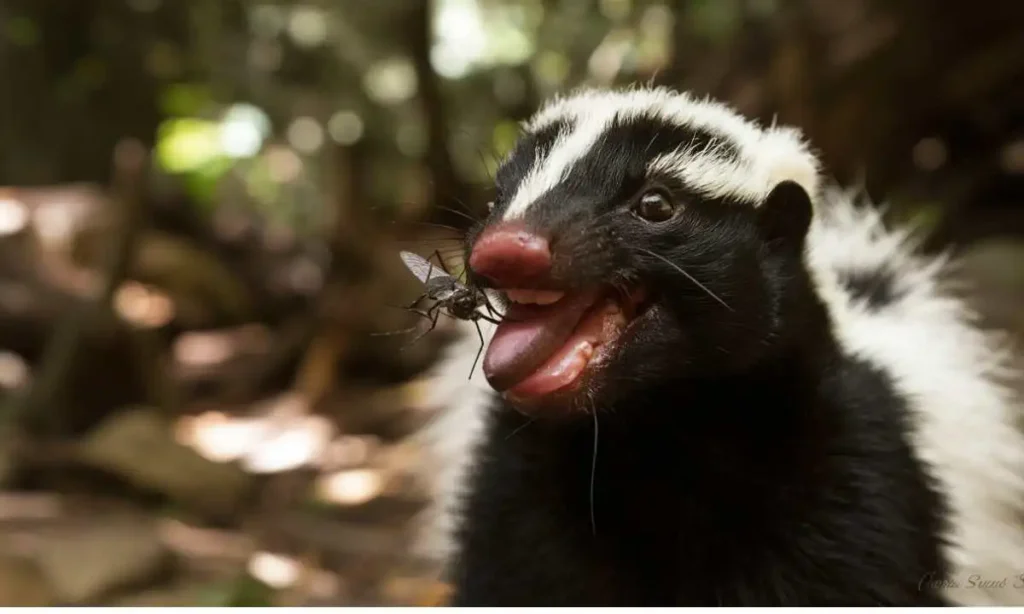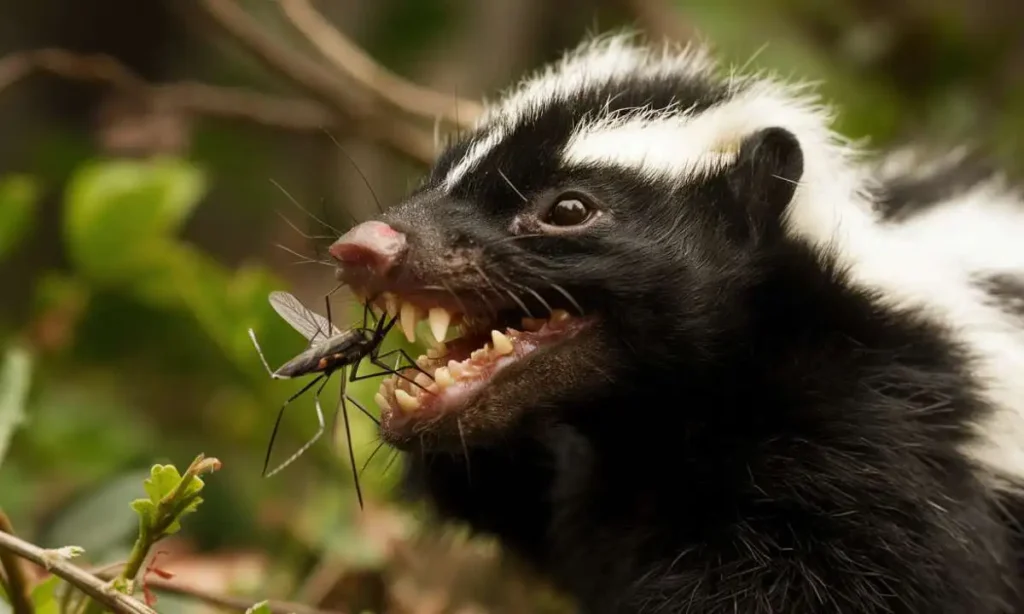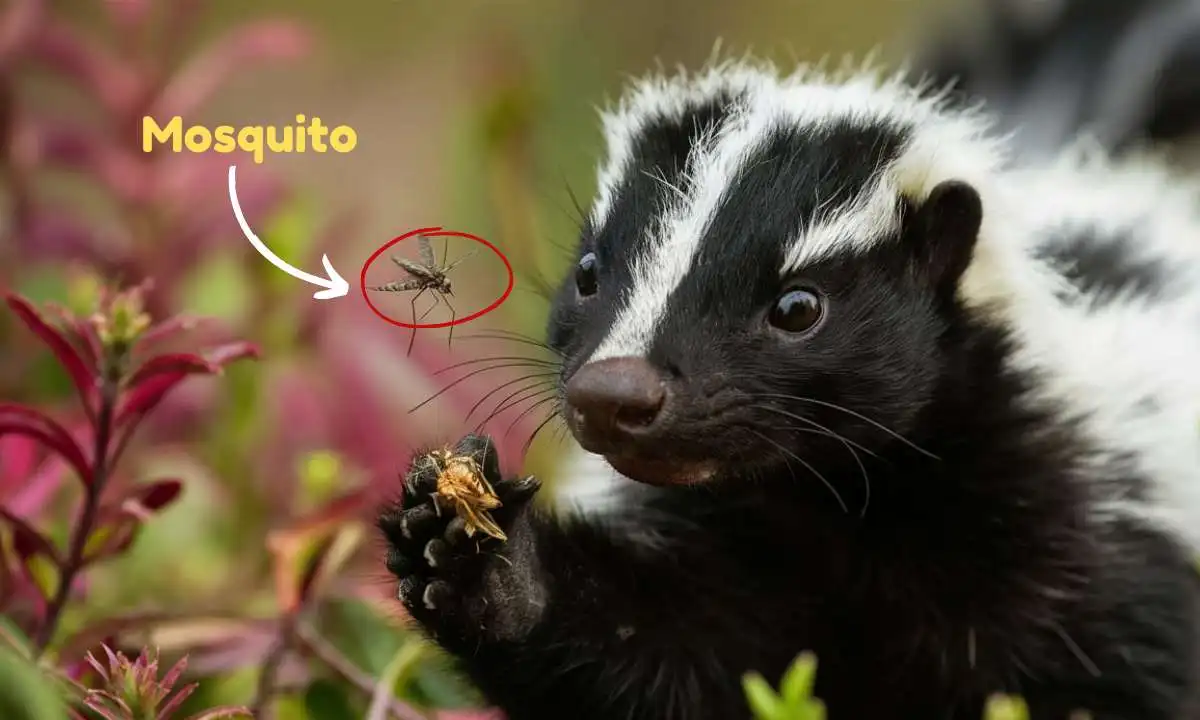Do Skunks Eat Mosquitoes?
Last updated on August 11th, 2024 at 07:30 am
Nope, they don’t. With my experience in keeping skunks as pets and studying wildlife, I’ve discovered they prefer other insects, small mammals, and plants. Want to know more about their diet and why they might visit your yard? Read on to learn more!
What Do Skunks Eat?
Do skunks eat mosquitoes? This question sparks curiosity among many. Skunks have a varied diet, making them fascinating creatures. Today, we’ll dive into what skunks eat and explore their dietary habits. Get ready to be surprised by the diverse menu skunks enjoy!
Skunks’ Favorite Foods
Skunks are not picky eaters. They enjoy a wide range of foods. Their diet changes with the seasons, ensuring they always have something to munch on. Let’s look at some of their favorite foods:
- Insects: Skunks love insects. Yes, they eat mosquitoes, beetles, grasshoppers, and larvae.
- Small Rodents: Mice and voles are on the menu. Skunks are great at controlling rodent populations.
- Fruits and Berries: They enjoy seasonal fruits and berries. Apples, cherries, and blackberries are skunk delicacies.
- Nuts: Skunks also eat nuts. Acorns and walnuts are among their favorites.
Seasonal Diet Variations
As seasons change, so does the skunk’s diet. They adapt to what’s available. Here’s a quick look at their seasonal preferences:
| Season | Preferred Foods |
|---|---|
| Spring | Insects, worms, small rodents |
| Summer | Fruits, berries, insects |
| Fall | Nuts, fruits, small rodents |
| Winter | Scavenged food, small rodents |
Do Skunks Help Control Mosquitoes?
Yes, skunks help control mosquitoes. By eating these pests, skunks contribute to reducing mosquito populations around our homes. This makes them a beneficial ally in our yards. So, next time you see a skunk, remember its role in keeping mosquitoes at bay!
Mosquitoes In The Skunk Diet

Skunks are known for their distinctive black and white coloring and unique smell, but their diet is often a topic of curiosity. These nocturnal creatures are omnivores, which means they eat both plants and animals. Among the various insects and small creatures they consume, mosquitoes are also on the menu. Understanding what skunks eat can give us insights into their role in the ecosystem, including their impact on mosquito populations.
What’s On The Skunk’s Menu?
Skunks have a diverse diet that changes with the seasons. They primarily feed on:
- Insects such as beetles and grubs
- Small rodents like mice
- Fruits and berries when available
- Eggs from ground-nesting birds
Mosquitoes, while not a major component, do become a part of their diet, especially during peak mosquito seasons.
Mosquito Hunting: A Skunk’s Nighttime Activity
Skunks are active at night when mosquitoes are most prevalent. Their foraging habits lead them to:
- Turn over rocks and logs in search of food
- Explore areas with high insect activity
- Catch and consume mosquitoes along with other insects
This behavior helps control local mosquito populations, providing a natural form of pest management.
The Importance Of Mosquitoes In The Skunk Diet
Although mosquitoes are a small part of their diet, they provide:
- Essential nutrients like protein
- A food source during times when other prey is scarce
Skunks aid in maintaining a balance in the ecosystem by consuming various insects, including mosquitoes.
The Role Of Mosquitoes In Skunks’ Diet

Do skunks eat mosquitoes? This question sparks curiosity among many. Skunks, known for their distinct smell, have diverse diets. They eat fruits, nuts, and small animals. But what about mosquitoes? Let’s dive into the role of mosquitoes in skunks’ diet.
Skunks are opportunistic eaters. They hunt for food based on availability. While mosquitoes are not their main food source, skunks will eat them if the opportunity arises. Mosquitoes can form part of a skunk’s diet, especially during the warmer months when these insects are abundant.
- Mosquitoes are easy to catch for skunks during their nighttime activities.
- They provide a source of protein, which is essential for skunks’ health.
- Eating mosquitoes also helps control the mosquito population in an area.
While mosquitoes play a small role in a skunk’s diet, they contribute to its nutritional diversity. This shows how skunks help maintain ecological balance by keeping mosquito populations in check.
Benefits Of Skunks Eating Mosquitoes
Many might wonder what benefits could possibly come from the presence of skunks. These often misunderstood creatures have a diet that includes various pests, among them mosquitoes. Skunks eating mosquitoes is not only a natural form of pest control, but it also contributes to a healthier ecosystem. Let’s delve into the advantages of skunks snacking on these buzzing insects.
Reduction In Mosquito Population
Skunks help maintain a balance in the mosquito population. By consuming these insects, they reduce the number of mosquitoes that can spread diseases to humans and animals. A lower mosquito population means fewer chances of mosquito-borne illnesses, such as West Nile Virus and Zika Virus.
Minimizing The Use Of Chemical Repellents
With skunks as natural predators to mosquitoes, the reliance on chemical repellents decreases. This leads to less environmental pollution and a safer habitat for other wildlife. It also lowers the potential health risks associated with chemical exposure to humans and pets.
Encouraging Biodiversity
Skunks contribute to biodiversity by preying on mosquitoes. Their role as predators supports the balance of different species within an ecosystem. This balance is crucial for the health and sustainability of natural habitats.
Supporting A Healthy Food Web
The diet of skunks includes more than just mosquitoes; they also eat various other insects and small rodents. By controlling mosquito populations, skunks ensure a more diverse food supply for themselves and other animals, reinforcing a robust food web.
Natural Fertilization
As skunks forage for food, they dig through the soil, aerating it and helping to mix in organic matter. This natural behavior can lead to better soil health and serves as a form of fertilization, promoting plant growth and a richer environment.
Impact On Mosquito Populations
Many creatures in the wild contribute to controlling insect populations, among them the skunk. Skunks are known for their distinctive spray but their diet is often a topic of curiosity. Particularly, people wonder, do skunks eat mosquitoes? This question is vital as it ties to the broader impact these mammals have on mosquito populations.
Do Skunks Help Control Mosquito Numbers?
Skunks are omnivores, meaning they eat both plants and animals. Their diet includes a variety of insects, which could lead to a natural reduction in mosquito numbers. While skunks are not specialized mosquito predators, they may consume mosquitoes as part of their insect intake.
Skunk Feeding Habits And Mosquito Consumption
Skunks are most active at dawn and dusk, coinciding with peak mosquito activity times. This overlap increases the chances of skunks eating mosquitoes. Their foraging behavior often leads them to grub up soil, where they might encounter and eat mosquito larvae.
Comparative Impact Of Skunks On Mosquito Populations
- Skunks have a varied diet and are not reliant on mosquitoes as a primary food source.
- Their impact on mosquito populations is minimal compared to specialized insectivores.
- Seasonal variations and availability of other food sources affect mosquito consumption by skunks.
Environmental Factors Influencing Skunks’ Diet
Several environmental factors dictate the availability of mosquitoes for skunks. Weather patterns, standing water, and local ecosystem health all play roles. Skunks adapt their diet to the most readily available food sources, which may or may not be mosquitoes, depending on these conditions.
Beneficial Roles Of Skunks In Ecosystems
| Role | Benefit to Ecosystem |
|---|---|
| Insect Control | Reduces populations of various insects, potentially including mosquitoes. |
| Seed Dispersal | Consumption of fruit contributes to seed dispersal and plant growth. |
| Soil Aeration | Foraging habits lead to soil aeration, benefiting plant roots. |
While skunks may not be the ultimate mosquito hunters, their presence in an ecosystem has a multifaceted impact. They play a part in controlling insects and contribute to a balanced environment. So, skunks do eat mosquitoes, but their role in mosquito population dynamics is just one piece of their ecological puzzle.
Other Natural Predators Of Mosquitoes
Skunks might snack on mosquitoes, but they’re not the only ones. Nature is full of creatures that feast on these buzzing pests. Let’s dive into the world of mosquito predators and learn who else is joining the fight against mosquitoes.
Besides skunks, many animals help control mosquito populations. These include bats, birds, fish, and even some insects. Each plays a unique role in this natural battle.
Bats: The Nighttime Mosquito Hunters
Bats are amazing mosquito catchers. A single bat can eat hundreds of mosquitoes in one hour. They hunt at night, using echolocation to find their prey.
Birds: Daytime Mosquito Patrol
During the day, birds take over. Many birds, like swallows and purple martins, eat mosquitoes. These birds soar through the sky, scooping up mosquitoes on the go.
Fish: The Water Warriors
In water, fish are the top mosquito predators. Certain species, like the Mosquitofish, specialize in eating mosquito larvae. They patrol water bodies, keeping mosquito populations in check.
Insects: The Smaller Champions
Even insects play a part. Dragonflies and some beetles prey on mosquitoes. They hunt both adult mosquitoes and larvae, making them valuable allies.
Together, these natural predators form a powerful team against mosquitoes. By understanding and supporting these creatures, we can help reduce mosquito populations naturally.
Frequently Asked Questions
What Insects Do Skunks Eat?
Skunks commonly eat beetles, grasshoppers, crickets, and various larvae. They also consume other insects, contributing to their omnivorous diet.
What Attracts Skunks To Your Property?
Skunks are attracted to properties by accessible food sources, like garbage or pet food, and shelter opportunities, such as woodpiles or decks. They also seek water sources and areas with minimal human disturbance for nesting. Removing these attractants can help deter skunks from your property.
What Are Skunks’ Favorite Foods?
Skunks primarily favor insects, small mammals, fruits, nuts, and plants. They also enjoy grubs, worms, berries, and occasionally raid garbage for food scraps.
Conclusion
Wrapping up, skunks offer natural mosquito control, consuming these pests as part of their varied diet. It’s a fascinating aspect of nature’s balance. Remember, a backyard skunk might just be an ally in your fight against mosquitoes. Embrace the wild, and let skunks play their role.

